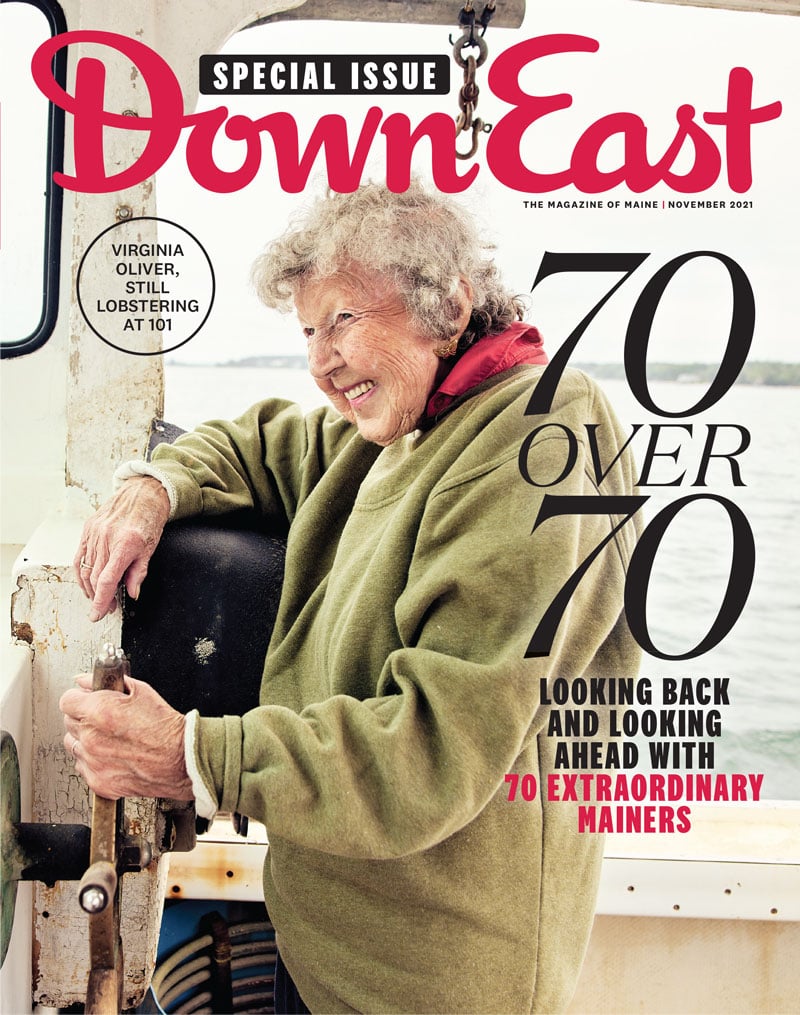By Brian Kevin
Photographed by Chip Dillon
From our November 2021 issue
In the summer of 1970, Doug Rawlings returned to the U.S. from the central highlands of Vietnam, changed by the 13½ months he’d spent attached to an artillery unit there, but not in the ways he’d privately hoped for when he was drafted. He didn’t feel like a Hemingway-esque hero who’d proven his mettle; mostly, he felt angry. He dabbled in anti-war activism, largely around Boston, then got a teaching degree, hoping to redirect his fervor into connecting with kids. He moved to Maine when he and his wife, Judy, started a family, eventually settling on a farmstead in Chesterville. In 1985, Rawlings was one of several cofounders of Veterans for Peace, which today claims thousands of members in 130 chapters worldwide.
Now retired from the University of Maine Farmington, where he still sometimes teaches a freshman Peace Studies seminar, he’s president of Maine’s Veterans for Peace chapter, an editor at Peace & Planet News, and the author or editor of eight books of poetry, including the just-published Cầu Tre (Bamboo Bridge), a collaboration with poet and Vietnam War refugee Teresa Mei Chuc.

What motivated your activism after returning from Vietnam?
I was so angry about what we had done to the Vietnamese people, children in particular. These Vietnamese kids would look at us with the coldest eyes. I’ve written a couple of poems about kids selling their mothers, their sisters. I looked at that and said, we did that to those kids? I could not stop thinking about it. This was before the concept of PTSD or moral injury were even part of the package. And it wasn’t as if I was in the infantry and saw my buddy die in my arms or any of that kind of stuff, but I saw enough. I was pretty much floating, and I just kept on saying, I can do this, I can put it behind me. But I couldn’t.
What’s the core of Veterans for Peace’s mission?
We have an aspiration to abolish war as an instrument of national policy. We realize we have a long way to go to get there. People say, oh, that’s a Pollyannaish idea. I like to point out it’s what Albert Einstein wanted. After World War I, he attended disarmament conventions where leaders wanted to designate which weapons were appropriate and so on. They didn’t want to stop war — what they wanted to do was make war more palatable. And Einstein got so angry. What he said was, there’s no way — we have to abolish war.
The organization was founded ten years after the fall of Saigon, so how much was the Vietnam experience the impetus?
At the outset, in the ’80s, it was really focused on Central America. And of course, everyone involved had our own personal baggage [from Vietnam], but we sat down and set up some driving prinicpals, one of which was that we were very clear about being nonviolent. People to this day will ask, “You were a veteran, so how come you’re for nonviolence?” Mainly because that’s the only way we can ever resolve these conflicts and because we’ve seen violence firsthand. We’re not antimilitary — some people in our organization are absolute pacifists, but most are not. We just want to be more reasonable, set up a defensive military, and address war’s underlying causes: the war industry, the munitions industry, the people who are invested in war. So we knew back then that even if we ended support for the contras, it wasn’t the end of our work. We just couldn’t see younger generations going off and doing what we had been doing.
How do older, Vietnam-era members work alongside vets of more recent wars — in Iraq, in Afghanistan? Can you help them find solace and a voice?
It’s tough sometimes. They don’t want to be talked down to. They’ve got their own stories to tell, and who are we? Our thing is, we were in demonstrations before you guys were even born. And don’t think the baggage you carry from Iraq and Afghanistan is much different than the baggage we carry, so why can’t you listen to us? They’re saying, Vietnam is old news, and we need to do our thing. And I’m torn — I can see where they’re coming from.
What’s your writing practice like?
I don’t want to pretend it’s mystical, but in a sense it is — I don’t know where a poem comes from. The last one, I just woke up early and looked out at this apple tree. It’s written for Afghan War vets, and the opening stanza is, “Stop struggling with the eyes of strangers — / try directing your thousand-yard stares / toward the apple tree by the stone wall / in the early morning light.” Then I go through all the other senses — smell, hearing, and so on — and it ends with this notion of: Let this stuff go. Come to your senses, connect with the natural world, and you can get through this. I mean, I try not to preach. When I moved up here, I didn’t do it purposefully, moving to the country to get away from the war. But in retrospect, that’s exactly what I did.






